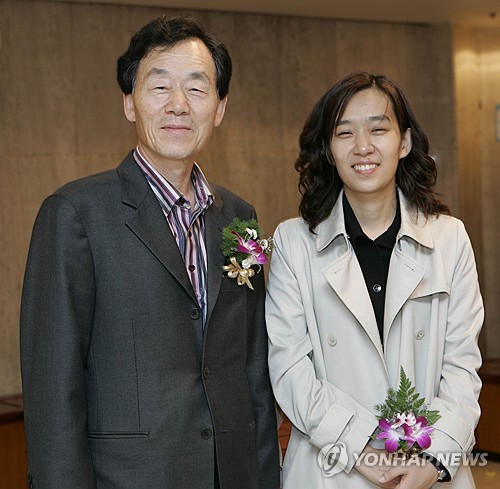- California Assembly OKs highest minimum wage in nation
- S. Korea unveils first graphic cigarette warnings
- US joins with South Korea, Japan in bid to deter North Korea
- LPGA golfer Chun In-gee finally back in action
- S. Korea won’t be top seed in final World Cup qualification round
- US men’s soccer misses 2nd straight Olympics
- US back on track in qualifying with 4-0 win over Guatemala
- High-intensity workout injuries spawn cottage industry
- CDC expands range of Zika mosquitoes into parts of Northeast
- Who knew? ‘The Walking Dead’ is helping families connect
Novelist Han Seung-won ‘stunned’ by daughter’s Nobel Prize win
South Korean novelist Han Seung-won, father of the country’s first Nobel laureate in literature, on Friday expressed astonishment at his daughter Han Kang’s win, saying it felt as if “the world had been turned upside down.”
Speaking from his home in Jangheung, about 321 kilometers south of Seoul, the father shared his reaction during an interview with a local radio program. “I was completely stunned,” he said, admitting he never expected his daughter to receive such a prestigious honor.
“There have been many instances where (the Nobel committee) selects someone unexpected,” Han said. “I guess I had this thought that my daughter could win out of the blue, but I never really counted on it.

His daughter’s victory Thursday marks a historic moment for South Korea, bringing the country its first-ever Nobel Prize in literature.
Han Kang received a phone call from the Nobel Prize committee about 10 minutes before the official announcement, according to the father.
Regarding his daughter’s literary style, the 85-year-old novelist commented that she portrays tragedy “in a very profound, beautiful, and sorrowful way.”
“I think she’s been talked about as an author with special significance since ‘The Vegetarian.’ Then came ‘Human Acts,’ followed by ‘We Do Not Part.’ As the Gwangju uprising and the April 3 Incident became connected, there’s a kind of love for the fragile humans who feel trauma from state violence and the world. I think that’s what the judges picked up on.”
He was referring to the pro-democracy civil uprising that occurred in the southwestern city of Gwangju in 1980 and the 1948 civilian massacre on South Korea’s southern island of Jeju by the government.
“There’s nothing to discard in Kang’s novels. Each one is a masterpiece. This isn’t just a case of a hedgehog thinking its own offspring is pretty.”
Born in 1939 in Jangheung, he debuted as a novelist in 1968. He has since been a prolific writer, with works including “Aje aje bara-aje,” “Chusa” and “The Life of Dasan.” Most recently, he published an autobiographical novel, titled “The Path of Humans,” early this year.
















